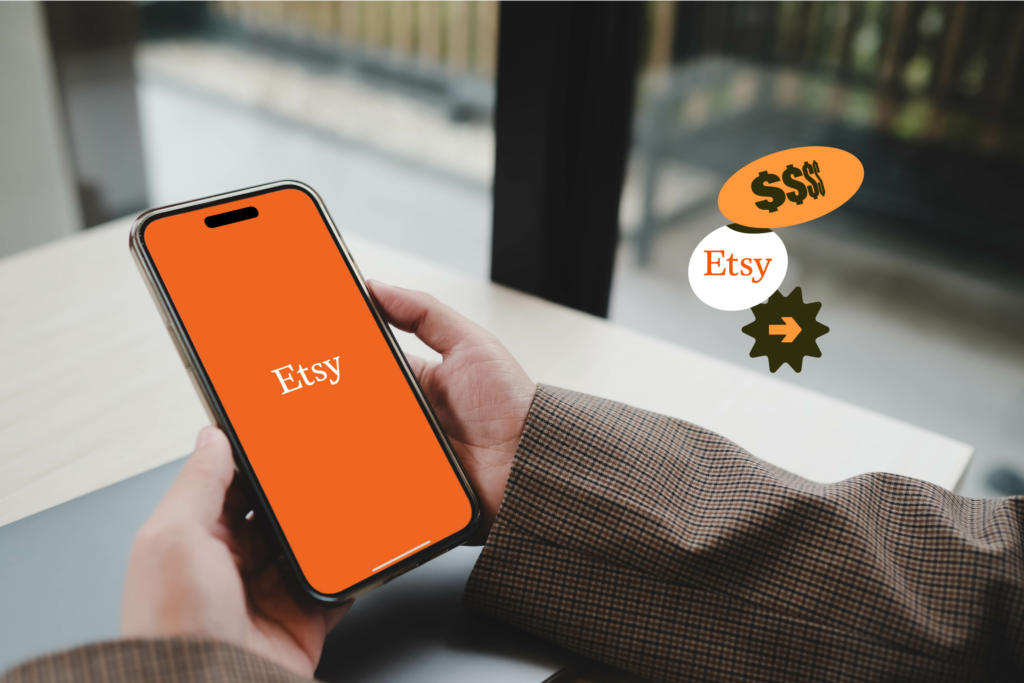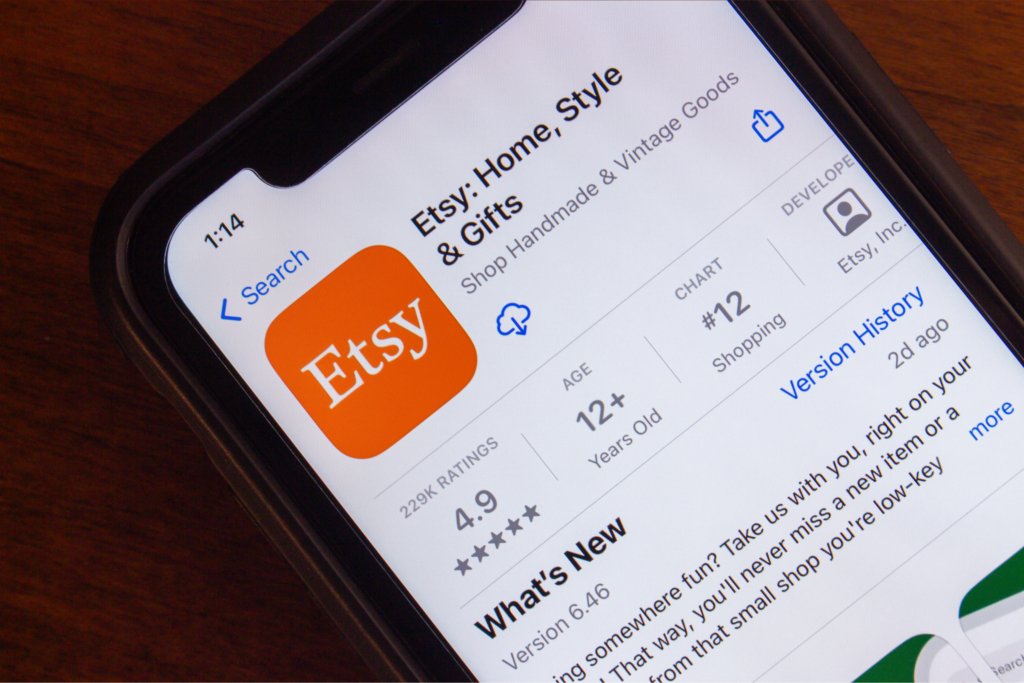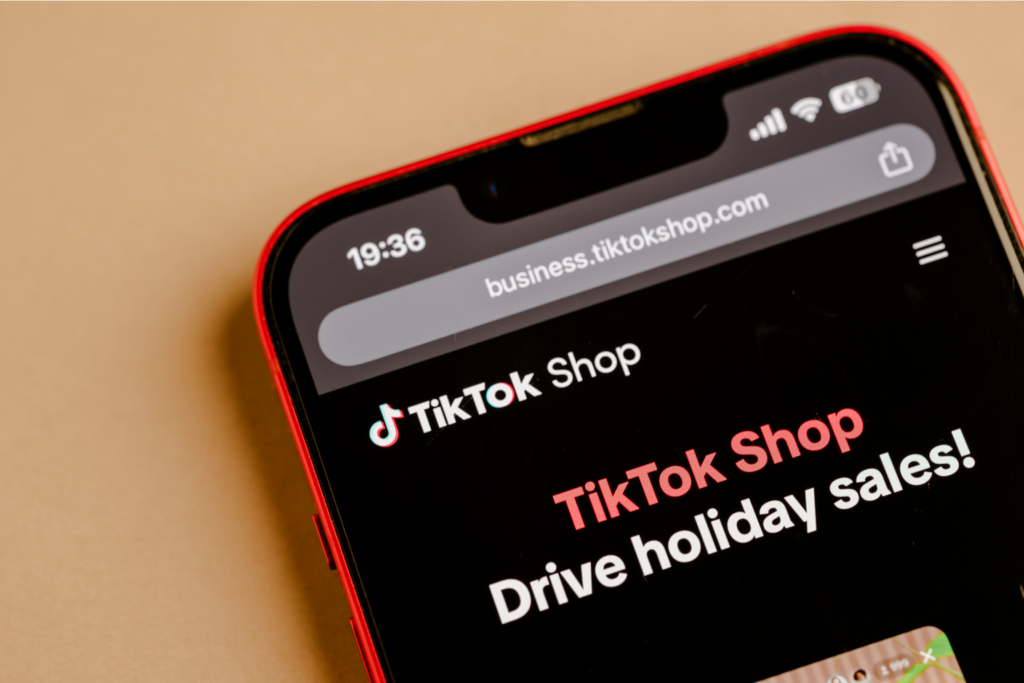Printify + your favorite platform = more sales!
Welcome to the world of eCommerce! With online retail sales booming and expected to hit $8 trillion by 2027, there’s never been a better time to get started. Shopifyand Etsyare two of the most popular platforms, but they serve different purposes – one is a full-fledged eCommerce website builder, while the other is an online marketplace.
In this guide, we’ll compare Shopify vs Etsy to help you determine the best fit for your online store.
This post may contain affiliate links, which means we may earn a commission if you make a purchase through those links. This comes at no additional cost to you.
Shopify vs Etsy: Overview
Shopify is an eCommerce website builder powering over 4.5 million active websites as of Q1 2025, trusted by brands like Allbirds and Gymshark. It lets you build an independent store with 227 paid ($100-500) and 13 free themes (with more free themes available). You can sell almost anything, automate tasks, and access over 8,000 apps for marketing, inventory, and customer management.
Etsy, on the other hand, is a marketplace with 89.6 million active buyers and 5.6 million sellers as of Q4 2024. Originally focused on vintage and handmade goods, Etsy now allows sellers to list print-on-demand merch,digital products, apparel, and more. It’s easy to start with no monthly fees, but there’s a $0.20 listing fee per item, and Etsy takes a cut of each sale.
The key difference between Shopify and Etsy reflects the contrast between a website builder and a marketplace – if you want full control over your online store, Shopify is the better choice. If you prefer low startup costs and built-in traffic, Etsy makes selling simple.
Make it happen today!
Which is better for you? Shopify vs Etsy 2026
Both sales channels are great choices for new sellers.
To help you decide which is better for you, we’ve compared the key features of both Shopify and Etsy – from store setup, pricing, and transaction fees to SEO tools, marketing, scalability, and analytics.
| Etsy vs Shopify | Etsy | Shopify |
|---|---|---|
| Product focus | Custom products, handcrafted goods, vintage items, and craft supplies. | Anything within the limits of the law. |
| Ease of store setup | Simple and straightforward. | Lengthy but guided process. |
| Design and layout options | Consistent store design with few customization options. | Range of customization options, including over 13 free and 227 paid themes. |
| eCommerce tools | Basic tool set and about 20 integrations, depending on the country. | Over 8,000 available apps. |
| SEO | Specific Etsy SEO requirements. | Basic built-in SEO tools plus apps to optimize content from the Basic plan. |
| Pricing | No monthly subscription fees. $0.20 for listing an item. Up to 20-25% in transaction fees. | Higher flat-rate monthly subscription fee but lower or no transaction fees when using Shopify Payments. |
| Analytics | Simple analytics tools for tracking essential KPIs. | Basic analytics in lower-tier plans, with advanced tools in the higher-cost ones. |
| Marketing tools | Etsy ads (including offsite ads), social media marketing integrations, and more than a dozen integrations (including email marketing tools). | Over 1,500 specific marketing tools in the app store. |
| Customer support | Help Center, Etsy Seller Handbook, forums, and newsletters. Slow email support. | 24/7 customer support, live chat, eCommerce experts, written documentation, and help center. |
| Scalability | Basic eCommerce functions, unlimited number of listings. Products must comply with Etsy policies. Standalone website with a Pattern subscription ($15 monthly). | Over 8,000 apps to scale; custom enterprise-level plans. |
| Selling internationally | Listings are visible to international buyers, and Etsy Payments supports multiple currencies. Etsy store owners must manually set up shipping rates and handle customs and taxes. | Shopify allows full localization with currency conversion, region-specific pricing, international payment methods, and automatic tax calculations. |
1. Shopify vs Etsy: Product focus
Here’s how selling on Shopify vs Etsy differs regarding products:
Etsy is a marketplace with clear guidelines on what products can be sold, focusing on handmade goods and craft supplies.While it has expanded its categories, sellers need to follow Etsy’s rules, and violations can lead to account suspension.
Shopify, on the other hand, gives you almost full control. Sell anything within legal limits and build a brand on your own domain without marketplace restrictions.
For sellers who want complete flexibility in what they sell, Shopify has the edge.
2. Etsy or Shopify? Ease of store setup

If you’re wondering whether Etsy or Shopify for beginners is the right choice, both platforms are user-friendly but offer different experiences.
Shopify walks you through setting up your shop, including inventory management, order tracking, and design customization. While the process is guided, learning how to manage and update everything properly takes some time and technical knowledge.
Etsy is much simpler. Once you create a shop, you just add listings and optimize them for Etsy search. There’s less customization, but it’s quick to start selling.
It all comes down to preference. Etsy is easier upfront, while Shopify offers more control but requires more setup work. A draw.
Compare Shopify to another beginner-friendly marketplace in our article about Shopify vs eBay.
3. Shopify or Etsy? Design and layout options
A well-designed online store can make or break your sales. 42% of shoppers leave a website because of poor design or functionality. So, how do Etsy and Shopify compare when it comes to design flexibility?
Etsy:
- Simple and uniform – Every Etsy shop has the same layout with limited customization. Sellers can add a logo and organize product collections, but the storefront design stays the same.
- Standing out – The best way to make your Etsy store unique is through high-quality product images and descriptions. Since customization is limited, strong visuals are key.
Shopify:
- More control – There are 13 free and over 227paidthemes, letting you fully customize your Shopify store. Tweak fonts, colors, and layouts to match your brand identity.
- Designed for growth – Unlike Etsy, Shopify gives creative freedom to build a store that stands out and converts visitors into buyers, with a wide range of customization options and third-party apps.
If you want a simple, ready-made storefront, Etsy works well. If branding and customization matter, Shopify is the better choice.
If having a beautifully designed online store is your top priority, check out our Shopify vs Squarespace article. Squarespace has amazing design options!
4. Shopify and Etsy: eCommerce tools

Both Shopify and Etsy offer tools to help sellers manage their online stores, track sales, and market their products, but Shopify provides much more flexibility.
Shopify has over 8,000 apps, allowing merchants to customize their stores with tools for inventory management, marketing automation, SEO, and customer support.
Etsy, in contrast, has a much smaller selection of integrations (around 20) focused on social media, analytics, and listing optimization. Many of these require subscriptions, and the Etsy app ecosystem is more limited than Shopify’s expansive app store.
Etsy Payments supports various payment methods, but transaction and payment processing fees can eat into profits.
For sellers who want full control over their store’s features and growth, Shopify is the better choice. Etsy provides the basics, but Shopify’s app store and customization options make it a much stronger platform for scaling a business.
5. Etsy vs Shopify: SEO

Search engine optimization (SEO) means increasing traffic and attracting the most visitors to your store, but Shopify and Etsy handle it differently.
Shopify is a website builder, so you’ll need to drive traffic from search engines like Google. This means researching keywords, optimizing URLs, improving site speed, and structuring your Shopify store properly. Some of these tasks may require paid apps to increase visibility.
Etsy, as a marketplace, has built-in traffic, so Etsy SEO is more straightforward. You mainly need to optimize your product titles, descriptions, tags, and attributes to rank well in Etsy’s search results. The platform handles technical SEO, like site speed and URLs for you.
Etsy has the advantage of ease of use since it requires fewer steps to optimize your store. Shopify SEO is more complex but offers greater control and potential for long-term growth.
6. Shopify vs Etsy: Fees and pricing

Pricing is one of the biggest factors when choosing between Shopify and Etsy, especially for print-on-demand sellers. Shopify charges a monthly subscription fee plus transaction fees, while Etsy has no monthly fee but takes a percentage of each sale.
Shopify offers a three-day trial and a $1 first month, after which sellers can choose from three plans:
- Basic Shopify:$39/month, 2.9% + $0.30 per transaction, includes two staff accounts and 24/7 support.
- Shopify:$105/month, 2.7% + $0.30 per transaction, includes five staff accounts, lower credit card fees, and additional sales tools.
- Advanced Shopify:$399/month, 2.5% + $0.30 per transaction, includes 15 staff accounts, lower shipping costs, and advanced reporting.
While Shopify Payments helps avoid extra transaction fees, paid apps can increase monthly costs as your store grows.
You don’t have to pay to open a shop, but Etsy charges other fees:
- Subscription fee: Free, or $10/month for Etsy Plus. $15/monthfor Etsy Pattern (for a separate website).
- Listing fee:$0.20 per item, plus another $0.20 renewal fee per sale.
- Transaction fee:6.5% of each sale.
- Payment processing fee:3% + $0.25 per transaction (varies by country).
- Other fees: Etsy may charge additional fees for advertising, currency conversion, shipping, and regulatory costs.
(All the transaction fees can add up to20-25% of a sale).
Etsy has the lead with lower upfront costs, making it more affordable for beginners. However, as sales increase, Etsy’s transaction fees can take a significant cut of your profits. Shopify’s monthly subscription is higher, but lower fees per sale can make it more cost-effective for high-volume sellers looking to scale their business profitably.
7. Shopify vs Etsy: Analytics

Both Shopify and Etsy provide analytics to help sellers track sales and optimize their online stores, but Shopify offers more in-depth reporting.
Shopify Analytics varies by plan. Basic reports include finance tracking and product performance, while higher-tier plans unlock detailed reports on sales, profits, customer behavior, and acquisition trends.
Advanced Shopify and Shopify Plus allow custom reporting, giving sellers insights into revenue per order, top sales channels, and discount performance. These tools help businesses make data-driven decisions and improve digital marketing strategies.
Etsy’s analytics tools are more simple. Etsy Stats shows traffic sources, conversions, and ad performance, helping sellers understand how many sales they generate and where their traffic comes from. Etsy Search Analytics tracks keyword performance and visibility.
Integrated with Google Analytics 4, Etsy’s reporting is straightforward and easy to use, making it accessible for beginners.
If you need basic insights, Etsy works well, but for detailed reporting and business growth, Shopify is the better choice.
8. Shopify vs Etsy: Marketing tools
With Shopify, you handle all marketing efforts – driving traffic through SEO, social media, email campaigns, and content marketing. The platform offers over 1,500 marketing apps for ads, automation, SMS marketing, and analytics.
Etsy, on the other hand, has built-in traffic. It helps sellers reach potential customers through Etsy ads, which promote listings across search results and other key pages. Combined with social media integrations and SEO, this makes it easier to attract buyers without external marketing efforts.
Another draw. For beginners, Etsy’s marketing tools are simple but effective. For sellers who want control and advanced strategies, Shopify provides more flexibility.
Compare other platforms with even more marketing tools in our article on Wix vs Shopify.
9. Shopify vs Etsy: Customer support

Good customer support makes running an online store much easier, especially when unexpected issues pop up.
Shopify provides faster, more direct assistance. Sellers can contact 24/7 phone, live chat, and email support or get help from the Shopify Help Center, experts, forums, and online communities.
Etsy, on the other hand, relies more on self-service options, including the Etsy Help Center, Seller Handbook, community forums, and newsletters. Email support is available, but responses can take time.
While both platforms provide useful documentation, Shopify wins for offering round-the-clock support and expert guidance, making it easier for sellers to get quick help when they need it.
10. Shopify vs Etsy: Scalability
As you grow your online store, choosing a platform that can scale with you is key.
Etsy is a good starting point since it provides a built-in audience and unlimited product listings. However, scaling can be tough due to listing fees and competition. You have few options to customize the storefront besides a Pattern subscription, and if you don’t master Etsy SEO, your products might get lost in the marketplace.
However, Shopify is built for growth. You have great control over your store design, product range, and branding, with thousands of apps to help scale your entire business beyond just an online shop. There are no extra fees for adding more products, and you don’t compete directly with other sellers on the same platform.
However, Shopify requires more upfront investment, and since it doesn’t have a built-in audience, you’ll need to focus on marketing and SEO to drive traffic.
It’s a draw. Etsy is easier to start with but limits long-term growth, while Shopify offers more scalability but requires effort and investment to succeed.
11. Shopify vs Etsy: Selling internationally
If you plan to sell worldwide, Shopify offers tools to help businesses expand globally. Set market-specific pricing, accept local payment processing methods, and create region-specific storefronts with automatic currency conversion.
Shopify also allows merchants to customize their store’s language settings and display region-based content, ensuring a more personalized shopping experience for international buyers. Additionally, sellers can calculate duties and taxes at checkout, helping customers avoid unexpected fees.
Etsy, on the other hand, makes it easy to sell internationally by allowing sellers to set up global shipping profiles. Your listings will automatically appear to potential customers worldwide, and Etsy Payments supports transactions in multiple currencies. However, Etsy’s international selling features focus more on shipping logistics rather than creating a localized shopping experience. Sellers must manually research and set international shipping rates, and Etsy doesn’t provide built-in tax calculations for global orders.
For merchants looking to scale internationally with a customizable online store,Shopify is the better choice due to its advanced localization tools, currency settings, and tax automation.
Which to choose for your business needs?
Deciding between Shopify and Etsy depends on your business model, product offerings, and long-term goals.
What types of businesses are best for Shopify?
As a dedicated platform for building your own website, Shopify is ideal for any business selling products while looking to establish a unique brand identity and maintaining full control over its online store. It’s optimal for:
- Scalable retailers: Businesses planning to expand their product range and scale operations.
- Custom branding: Those seeking to create a distinct online presence with customizable templates.
- Diverse products: Sellers offering various products, including manufactured goods.
While Shopify requires proactive marketing efforts to drive traffic, it offers lower transaction fees and supports different payment processing options, including Shopify Payments. This platform is perfect for businesses ready to invest in building their brand and managing their own website.
Considering a print-on-demand Shopify business? Find more information on our website.
What types of businesses are best for Etsy?
As a specialized online marketplace for artisans, crafters, and vintage sellers, Etsy is ideal for:
- Customized or personalized items: Etsy is a top choice for businesses offering custom products, such as personalized gifts, engraved jewelry, and made-to-order apparel.
- Handmade goods: If you create unique, handcrafted items, Etsy’s audience appreciates and seeks out such products.
- Vintage items: Sellers offering vintage products can find a dedicated customer base on Etsy.
- Craft supplies: Sellers providing materials for crafting can also thrive here.
Etsy’s built-in audience means less effort in driving traffic, allowing creators to focus on their craft. However, be mindful of listing and transaction fees, which can quickly add up.
If you’re comparing Shopify vs Etsy for Print on Demand, many POD sellers use Etsy to offer customizable designs on t-shirts, mugs, and home decor without holding inventory.
FAQ
Which is better, Shopify or Etsy? That depends on the eCommerce model you’re looking for. Comparing Shopify to Etsy is a way to contrast an eCommerce website builder with a marketplace. Choose Shopify if you want to create a whole website with more control over design and original domain names.
Tip: Find out the key aspects to make your online business successful by checking out our list ofsuccessful Shopify stores.
If you’re struggling to choose between Shopify and Etsy, here’s some good news: you can have both. Within the Shopify app store, you can even integrate a Shopify store with the Etsy marketplace, making multichannel selling easier and more efficient.
Synchronization in real-time allows products to be streamlined through both platforms, regardless of price changes or inventory.
The choice between Shopify vs Etsy depends on your goals.
- Etsy is a great online marketplace with a built-in audience, making it ideal for selling handmade goods and vintage items. However, Etsy’s transaction and listing fees can add up, and sellers have limited branding control.
- Shopify is a dedicated eCommerce platform that lets you build your own website, customize your store, and avoid higher transaction fees when using Shopify Payments. However, it requires a monthly subscription and more effort to attract traffic.
Many growing businesses use Shopify and Etsy simultaneously, leveraging Etsy’s audience while directing new customers to their own stores for better profits and control.
Shopify vs Etsy: Which one is better?
Etsy is a great starting point for new sellers. It has low upfront costs, an easy setup, and a built-in audience, making it perfect for selling vintage items, handmade goods, andcustom products online. However, transaction fees add up, customization is limited, and sellers need to follow Etsy’s marketplace rules, which can restrict growth.
Shopify gives you full control over your own online store, offering custom branding, scalability, and a vast selection of eCommerce tools. You’ll need to put in more effort to drive traffic, and monthly subscription fees can increase with apps, but Shopify allows for long-term growth without platform restrictions.
The best choice depends on your business goals. If you want a simple, low-cost start, choose Etsy. If you’re looking to build and scale a brand with complete control, Shopify is the way to go.
If Etsy isn’t the right fit for you, explore Etsy alternatives for other marketplace options. If you prefer a standalone store but want different pricing, check out Shopify alternatives to find the best platform for your business.












